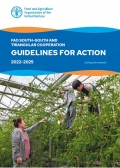News

07 Jan 2022
The Food and Agriculture Organization of the United Nations (FAO) has embraced South-South and triangular cooperation (SSTC) as a key delivery modality to catalyse agricultural development, food security, rural development, poverty reduction and nutrition over the past two decades. FAO has strengthened its support for SSTC since 2012, and the SSTC portfolio has been expanding in line with the progressive institutionalization of SSTC in FAO.
The main objective of the new SSTC Guidelines for Action is to develop a results-focused vision and structure, providing strategic direction for FAO’s SSTC programme and strengthening FAO’s position as global advocate, convener, broker, facilitator and...
23 Dec 2021
On Monday, December 20, 2021, FAO’s Dryland Forestry team hosted the webinar “Climate action after COP26: Gender responsiveness from local to global” as part of the Forestry Technical Network (FTN) series. The FTN is a network aiming to ensure a high standard of technical expertise through the promotion of innovative practices in FAO’s work with forestry by providing a platform to sponsor the exchange of ideas and experiences.
With many thanks to FAO’s South-South and Triangular Cooperation Division as well as the FAO Forestry Division, this multistakeholder event took place with interpretation in 5 languages: Arabic, English, French, Portuguese, and Spanish,...
09 Dec 2021
On 9 December 2021, the Flexible Multi-Partner Mechanism (FMM) launched FAO’s first-ever digital field trip targeted towards FMM Resource Partners - Belgium, Flanders, France, Italy, the Netherlands, New Zealand, Norway, Sweden and Switzerland. The virtual experience brought resource partners closer to the life-changing initiatives and real-world impact that they support through the FMM.
06 Dec 2021
The Desert Locust (Schistocerca gregaria) is the most destructive migratory pest in the world. These ravenous eaters can consume food crops and forage equivalent to their own weight in a day. Just a single square kilometer of swarm can contain up to 80 million adults, with a capacity to consume the same quantity of food of 35 000 people in a day.
In response to this plant pest threatening the food security and livelihoods of rural people, the FAO-China SSC Programme implemented its first USD 2 million emergency project from June 2020 to June 2021 to support FAO’s global efforts on...
06 Dec 2021
6 December 2021 - The Food and Agriculture Organization of the United Nations (FAO), the International Rice Research Institute (IRRI), and the Government of the United Republic of Tanzania, through the Tanzania Agricultural Research Institute (TARI), launched a two-day rice-commodity development workshop, with the aim of strengthening the Tanzania’s rice value chains.
The workshop builds on the National Rice Development Strategy II (NRDS-II), the country’s ongoing ten-year rice improvement programme (2019/20 – 2030), which aims to sustain rice self-sufficiency in Tanzania and improve its competitiveness and comparative advantages for regional and international rice trade.
Rice in Tanzania is increasingly becoming one of...